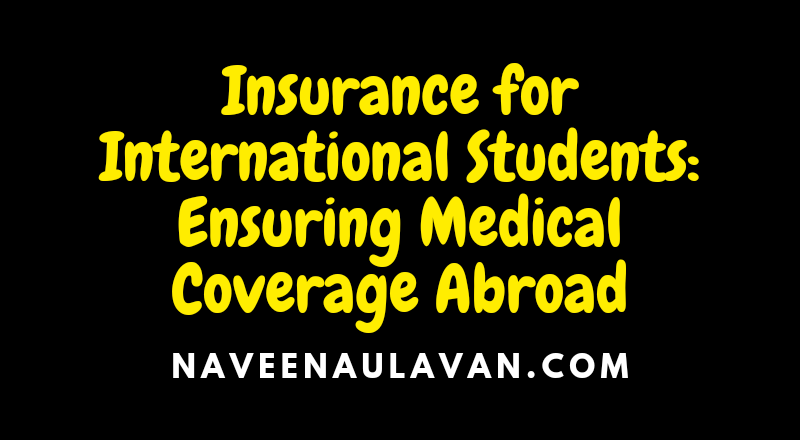Studying abroad can be an exciting and transformative experience for international students. However living in a foreign country comes with its own set of challenges particularly when it comes to accessing healthcare. It is essential for international students to have proper medical insurance to ensure that they receive the necessary care and financial protection while studying abroad. This article will explore the importance of insurance for international students and provide guidance on choosing the right coverage.
The Importance of Medical Insurance
Moving to a new country entails adjusting to a different healthcare system which can be complex and unfamiliar. Medical insurance is crucial to ensure that international students have access to affordable and high-quality healthcare services during their time abroad. Here are some key reasons why having medical insurance is essential for international students:
Financial Protection
Medical treatments and emergencies can be costly and without proper insurance coverage international students may find themselves facing significant financial burdens. Medical insurance provides financial protection by covering the cost of medical treatments hospital stays prescriptions and other healthcare services. It ensures that students are not overwhelmed with unexpected healthcare expenses that can potentially disrupt their studies or strain their finances.
Access to Quality Healthcare
Having medical insurance enables international students to seek medical care without hesitation. With insurance coverage students can visit doctors hospitals and specialists and receive the necessary medical attention when needed. This access to quality healthcare is crucial for maintaining good health and well-being while studying abroad.
Peace of Mind
Knowing that they are covered by comprehensive health insurance brings peace of mind to international students. It allows them to focus on their studies and enjoy their time abroad without worrying about the financial implications of unexpected medical situations. Having insurance provides a sense of security ensuring that students can seek medical care whenever required.
Types of Insurance Coverage
When it comes to insurance for international students there are a few different options to consider. Here are the main types of coverage available:
University-Sponsored Insurance
Many universities offer their own insurance plans specifically tailored to the needs of international students. These plans are often comprehensive and provide coverage for medical treatments emergency services prescription drugs mental health services and more. University-sponsored insurance plans usually have partnerships with local healthcare providers making it easier for students to access care. It is important for international students to carefully review the coverage and costs of these plans to ensure they meet their specific needs.
Private Health Insurance
International students also have the option of purchasing private health insurance from insurance providers in the country they are studying in. Private insurance plans can offer a wider range of coverage options including additional benefits such as dental and vision care. Students should research and compare different private insurance plans to find the one that best suits their needs and budget.
Government-Sponsored Programs
In some countries the government provides healthcare programs for international students. These programs are designed to ensure that students have access to necessary healthcare services. However coverage may vary depending on the country and the specific program. International students should check if they are eligible for government-sponsored programs and understand the extent of coverage provided.
Choosing the Right Insurance
Selecting the right insurance coverage can be a daunting task. Here are some factors to consider when choosing insurance for international students:
Coverage and Benefits
Evaluate the coverage and benefits offered by different insurance plans. Consider the extent of coverage including medical treatments hospitalization emergency services prescriptions and mental health services. Look for additional benefits that may be important to you such as dental and vision care preventive screenings and coverage for pre-existing conditions.
Network of Healthcare Providers
Check if the insurance plan has a network of healthcare providers that includes doctors hospitals and specialists in the area where you will be studying. Accessing in-network providers often results in lower out-of-pocket costs. Ensure that the plan has partnerships with reputable hospitals and providers to ensure quality care.
Coverage Period
Consider the length of coverage provided by the insurance plan. Ensure that the coverage period aligns with the duration of your studies including any pre- or post-study periods. It is crucial to have continuity of coverage throughout your academic journey.
Cost and Affordability
Be aware of the costs associated with the insurance plan including monthly premiums deductibles copayments and coinsurance. Estimate your potential medical expenses based on your health needs and budget and choose a plan that provides a balance between affordability and coverage.
Claims Process
Understand the claims process of the insurance plan. Determine how to submit claims what documentation is required and how long it takes for claims to be processed and reimbursed. A hassle-free and efficient claims process is important to ensure a smooth experience when utilizing the insurance coverage.
Conclusion
Insurance is a vital aspect of ensuring the well-being and safety of international students studying abroad. It provides financial protection access to quality healthcare and peace of mind. By considering the different types of insurance coverage available and evaluating factors such as coverage cost and claims process international students can make informed decisions and select the right insurance that meets their unique needs. With proper insurance coverage international students can focus on their studies embrace new experiences and thrive in their chosen academic pursuits while feeling confident that their health is protected.
